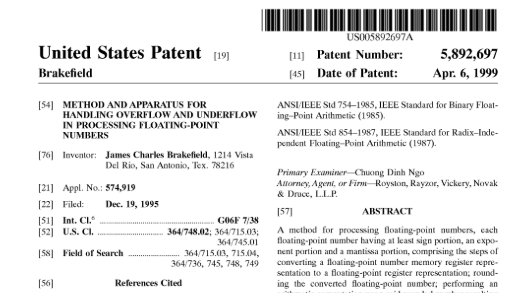The U.S. District Court for the Eastern District of Texas has a well-earned reputation as a place where non-practicing entities, more colorfully known as patent trolls, use their dubious patents to extort money from companies that actually do things and make stuff. So it was deeply gratifying to see infrastructure-as-a-service provider Rackspace Hosting win a summary dismissal of a patent claim brought by Uniloc USA.
Uniloc claimed a patent of a general method for rounding floating point numbers and argued that the Red Hat Linux used by Rackspace infringed upon it. Red Hat defended Rackspace as part of its program for indemnifying customers against such claims.
The Uniloc patent was silly and clearly should never have been granted; the method claimed is neither novel nor non-obvious–two of the three legs on which all patents rest. But mere silliness often fails to stop patent claims from dragging on for years a tremendous expense to all concerned. So the quick end to this case is something of a miracle, especially in a district where patent holders have a very strong chance of winning.
The case does not address the general issue of software patentability nor does it, as some reports have held, determine that mathematical algorithms are not patentable. But Judge Leonard Davis found (PDF of ruling courtesy of Groklaw.net) that the patent in dispute failed to comply with the rules of patentability of algorithms as laid out by the Supreme Court, mainly in Gottschalk v. Benson and in re Bilski. Judge Davis wrote:
[A]ccording to the patent itself, the claims’ novelty and improvement over the standard is the rounding of the floating-point number before, rather than after, the arithmetic computation… Claim 1 merely constitutes an improvement on the known method for processing floating-point numbers… Claim 1, then, is merely an improvement on a mathematical formula. Even when tied to computing, since floating-point numbers are a computerized numeric format, the conversion of floating-point numbers has applications across fields as diverse as science, math, communications, security, graphics, and games. Thus, a patent on Claim 1 would cover vast end uses, impeding the onward march of science.
A few more Judge Davises and the patent mess could look a whole lot less messy.

“A few more Judge Davises and the patent mess could look a whole lot less messy.”
Right, *somebody* needs to stop this insane patent troll stuff.
I love the variety and breadth of topics you bring to the Techpinions site.
Joe
Thank you, Joe. We try.
For the reason that the admin of this site is working, no uncertainty very quickly it will be renowned, due to its quality contents.
all the time i used to read smaller articles or reviews which as well clear their motive,
and that is also happening with this article which I am reading now.
I for all time emailed this web site post page to all my contacts, for the reason that
if like to read it afterward my links will too.
Hello very nice blog!! Guy .. Beautiful .. Wonderful ..
I will bookmark your website and take the feeds additionally?
I am glad to seek out numerous helpful info right here in the submit, we want develop extra strategies in this regard,
thanks for sharing. . . . . .